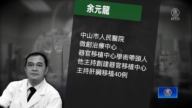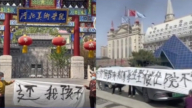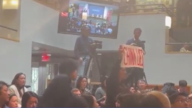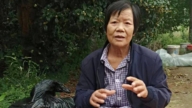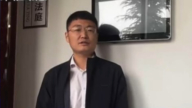【新唐人2014年01月29日訊】中國法律學者許志永,被中共當局以「聚眾擾亂公共場所秩序罪」判處有期徒刑4年,引起海內外輿論強烈譴責。週一,中國五名法學教授聯名發表法律意見書,論證許志永無罪。評論指出,中共在庭上判決許志永,但是輿論在民間審判中共的違法行為,判當局死刑。
許志永1月26號被中共判處有期徒刑4年後,27號,「北京大學法學院」甘培忠、彭冰,「中國人民大學法學院」姚歡慶,「中國政法大學民商經濟法學院」教授王湧,以及「清華大學法學院」副教授何海波等五名教授,聯名發表「為甚麼我們認為他無罪」的法律意見書,公開為許志永鳴冤抱屈。
這份意見書從法律角度,分析許志永的行為不構成「聚眾擾亂公共場所秩序罪」。理由是,通過和平方式在公園、廣場、大學等公共場所表達合法意見,這類行為屬於這些場所的正常秩序的一部分。
此外,主張「官員財產公示」的觀點,是正當的意見表達﹔通過橫幅、傳單等和平方式表達意見,也沒有擾亂相關場所的秩序。
意見書指出,許志永案所控事實應當被視為公民踴躍參政議政的一個範例,不應作為犯罪事件處理。
「東南大學」法學教授張讚寧向《新唐人》指出,許志永被判刑,實在是中國司法的一大恥辱,在全世界人民面前暴露出中國法制的虛偽性。
東南大學法學教授張讚寧:「它判許志永刑的話,等於是踐踏了中國的憲法和法律,因為許志永做的都是維護憲法,維護法律的一些事情,但是偏偏這樣一個好人判刑了,這是中國司法界的一大恥辱,判許志永刑的那些人,將永遠被釘在歷史的恥辱柱上。」
許志永2012年發起的「新公民運動」,主張自由、民主、法治,呼籲官員公示財產,教育平權,倡議公民「同城聚餐」,主要是喚醒公民參與意識,推動中國進步。在他的倡導下,數以千百計的中國民眾投入「新公民運動」,他們在街頭打出橫幅,要求官員公布財產等。
但是,從去年開始,「新公民運動」發起人以及參與者,陸續遭到中共的逮捕、起訴。除了許志永外,趙常青、侯欣、劉遠東、丁家喜、李薇、張寶成、袁東都被控「擾亂公共秩序罪」 。
許志永的代理律師張慶方認為,中共當局對許志永的判決,是為了殺雞儆猴。
許志永代理律師張慶方:「它們(中共)要用法律語言告訴社會上的維權人士,不要觸碰政府的紅線,不論你基於甚麼目地,不論你為了推動甚麼樣的目標,只要採取街頭政治的方式,那都會像許志永一樣被關進監獄。」
張讚寧指出,中共當局嚴重的違反了中國的憲法和法律,憲法所提倡的言論自由完全是一句空話。
張讚寧:「這樣做證明了當局所謂的政法體制改革,也是虛偽的,也是假的,它把自己已經放在了公民的對立面了,放在人民的對立面了。它們在庭上判許志永的刑,但是在民間等於是在審判當局的違法行為,它早晚上要受到清算的,被人民所拋棄的。」
中共對許志永等人的判決,不但引起中國民間的強烈反彈,也引發了國際社會的強烈抨擊。
26號,美國國務院發表聲明,對判決結果深感失望,並敦促中共當局立即釋放許志永等政治犯,停止限制他們的行動自由,保證他們的人權和自由得到保障。
國際人權組織「國際特赦」也發表聲明,指責中共當局再次選擇以恐怖治國,而不是以法治國,並痛批這一判決結果「可恥」。
美國「人權觀察」也發表聲明,譴責中共所謂「反腐」的虛偽性,並說中共宣稱將反腐鬥爭進行到底,卻把同樣要求反腐的中國公民送進了監獄。
採訪編輯/李韻 後製/李勇
Five Chinese Law Professors Argue Xu Zhiyong’s Innocence
Chinese legal scholar Xu Zhiyong was
sentenced to four years imprisonment for
“gathering crowds to disrupt public order.”
The verdict has received strong condemnation.
Five law professors in China issued a joint legal
opinion to demonstrate Xu Zhiyong’s innocence.
Commentators analyze that while the Communist
regime found Xu Zhiyong guilty, public opinion
finds the regime guilty of violating the law.
Xu Zhiyong was sentenced to four
years imprisonment on January 26.
The following day, five academics from China,
jointly published an independent review.
This included; Professors Gan Peizhong and
Peng Bing from Peking University Law School;
Professor Yao Huanqing from Renmin
University of China Law School;
Professor Wang Yong from China
University of Political Science and Law;
and Associate Professor He Haibo
from Tsinghua University School of Law.
The review, “why we think he’s innocent”
examined the injustice Xu Zhiyong has faced.
It conducted a legal analysis of Xu Zhiyong’s conduct.
It considered the peaceful, public demonstrations
of opinion at parks, squares and universities.
This is part of normal order in such places and
concluded that it does not constitute the crime
of ”gathering crowds to disrupt public order.”
The professors argued that advocating making officials
property public is a legitimate expression of opinion.
Banners and flyers are peaceful
means to express these views.
No public disorder has been created.
The review indicated that Xu Zhiyong’s case should have
been regarded as an example of citizens’ active participation
in the regimes politics, rather than being treated as a crime.
Zhang Zanning, Law Professor at
Southeast University spoke to NTD.
Xu Zhiyong’s sentence is indeed a
shame on the Chinese justice system.
It has fully exposed to the world the
hypocrisy of the Chinese legal system.
Professor Zhang Zanning: “Xu Zhiyong’s sentence is
tantamount to trampling on China’s constitution and laws.
What Xu Zhiyong has done is to uphold the constitution
and safeguard the law, but he was sentenced for that.
This is a great shame on the Chinese judicial system.
Those who sentenced Xu Zhiyong will
forever be nailed into history with shame.“
Xu Zhiyong launched the New Citizens’ Movement in 2012.
The movement advocated freedom, democracy,
rule of law, declaration of officials property, equal
education rights, and citizen meal time gathering.
This was to bring awareness for citizens to
participate in promoting Chinese civil rights.
Under his initiative, thousands of Chinese have taken
to the streets and participated in these movements.
However, since last year, the founders and participants
of the New Citizens’ Movement have been subjected
to arrest and prosecution by the Chinese regime.
As well as Xu Zhiyong, also accused of disrupting
public order are Zhao Changqing, Hou Xin, Liu Yuandong,
Ding Jiaxi, Li Wei, Zhang Baocheng, and Yuan Dong.
Xu Zhiyong’s defense attorney Zhang Qingfang believes that
Xu’s sentence is the regime’s threat, and a warning to others.
Zhang Qingfang, lawyer: “In the language of the law, they
tell the activists not to cross the government’s red line.
Regardless of the purpose or goal, street politics will end
up with the same fate as Xu Zhiyong, being thrown into jail.“
Law Professor Zhang Zanning points out that the Communist
regime has seriously violated China’s constitution and laws.
Freedom of speech in the constitution is empty talk.
Zhang Zanning: “The so-called political and
legal reform is simply hypocritical and a fraud.
It has placed itself in opposition to Chinese citizens.
The court sentenced Xu Zhiyong, but the trial was
tantamount to judging the violations of the regime.
The regime will be subject to liquidation,
and abandoned by the people sooner or later.“
The regime’s decision against Xu Zhiyong
has caused a strong rebound domestically.
It has also received strong criticism
from the international community.
The US State Department said in a statement on
January 26 that the US was “deeply disappointed.”
It called on the Chinese authorities to release
Xu and other political prisoners, immediately.
It also called to end any restrictions on their freedom of
movement, and guarantee them protection and freedom.
Amnesty International said, “the Chinese authorities have
once again opted for the rule of fear over the rule of law.”
Further, it condemned the verdict as “shameful.”
Human Rights Watch also issued a statement condemning
the hypocrisy of the anti-corruption campaign. “When an
average citizen takes up the same cause, he’s sent to prison.”
Interview & Edit/LiYun Post-Production/LiYong



